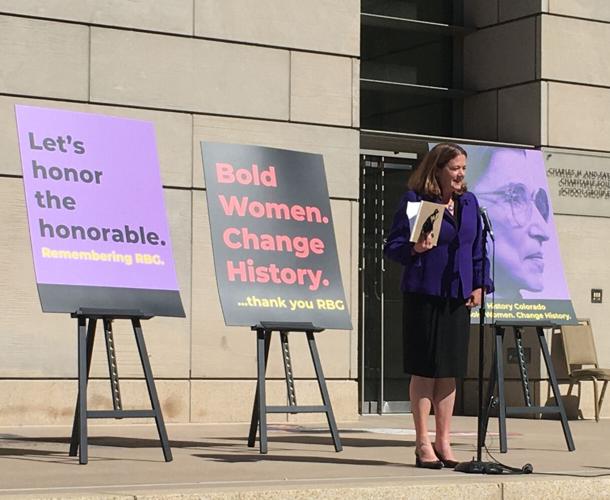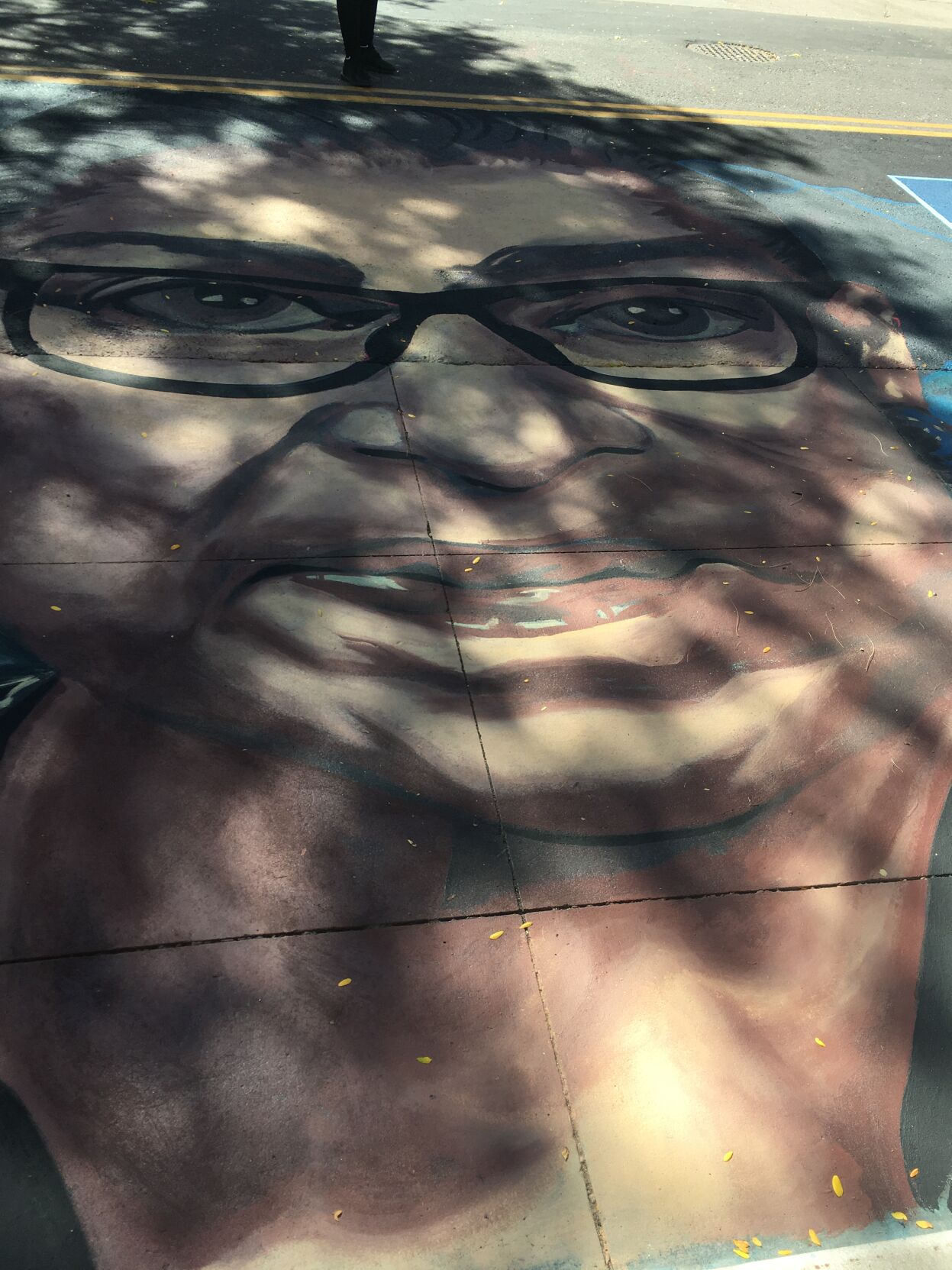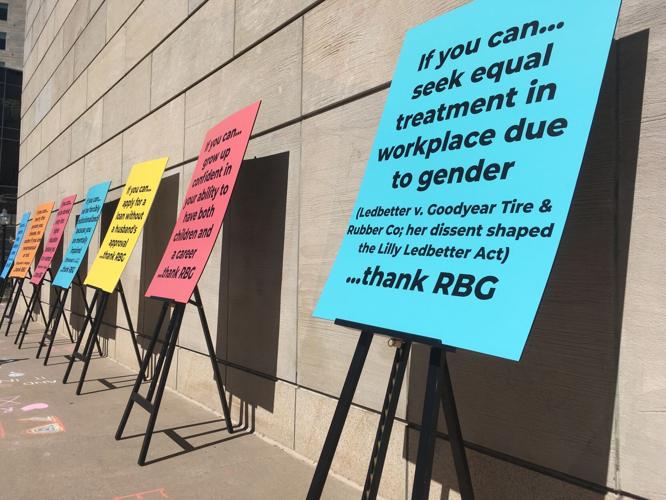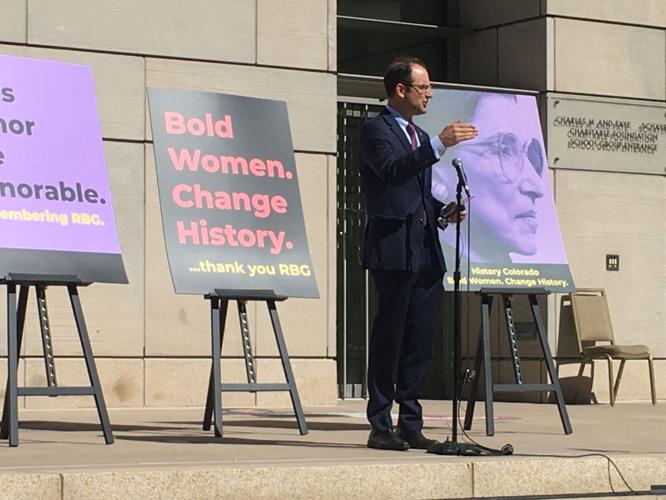Street art, speakers honor Ginsburg at History Colorado event
A group of predominantly women gathered outside History Colorado on Tuesday morning to commemorate the late U.S. Supreme Court Justice Ruth Bader Ginsburg. But multiple speakers sent the message that the progressive jurist’s work touched more lives than just women’s.
“Yes, she was a strong, proud and indomitable feminist who was known and celebrated for what she did for us as women,” said state Supreme Court Justice Melissa Hart. “But men’s lives are different too.”
Posters outside the museum listed the legal rights, from same-sex marriage to limitations on forced institutionalization, that Ginsburg contributed to through her votes on the Court. Hart was a clerk for former Justice John Paul Stevens at the same time that Attorney General Phil Weiser clerked for Ginsburg.
“What the arc of her work tells us,” he said at the downtown Denver event, “is we don’t demonize people along the way. We don’t take the bait and rise to anger. Instead, we must remember a spirit of grace and inclusion.”
Weiser brought up Ginsburg’s friendship with conservative Justice Antonin Scalia, who died in 2016, as an example of advancing ideals without falling into toxic partisanship.
“Justice Ginsburg’s legacy calls on us to be our best, authentic selves, which means not to demonize others, but to take the long game. See everybody as someone we can learn from, who we can engage with as we work together to form a more perfect union,” Weiser said. “It’s not easy to do, but our democracy depends on everyone being on the field.”
In addition to History Colorado, former Lt. Gov. Donna Lynne and the Bonfils-Stanton Foundation provided financial support for the commemoration. Denver artist Adri Norris began a street mural on Sunday, culminating in Ginsburg’s face and the letters “RBG” drawn onto East 12th Avenue between Broadway and Lincoln Street by Tuesday.
The museum noted that Ginsburg argued her first sex discrimination case in 1972 in the the U.S. Court of Appeals for the 10th Circuit, which is based in Denver. She won the case after a federal panel of judges declared invalid a tax provision that provided a deduction for single women caring for dependents, but not single men.
Ginsburg died on Sept. 18 after 27 years on the Supreme Court. President Donald Trump has already nominated a successor, despite the precedent Republican senators set in 2016 of not considering Supreme Court appointments in an election year. Ginsburg said prior to her death that her wish was to “not be replaced until a new president is installed,” but Trump dismissed it as allegedly a fabrication from congressional Democrats.
Hanna Bustillo, who attended the Denver commemoration, was a former clerk for Hart. She said she was from a family of people who were conservative or apolitical, and came to the event to be around people who appreciated the meaning of Ginsburg’s life and work.
“Everything that she spoke about in all of her opinions related to gender equity. She actually lived her personal life and raised her children by having an equitable marriage,” Bustillo said. “Being a newly-married person, I try to emulate that with my partner.”
Bustillo was worried about what the upcoming confirmation process would mean for the country, but tried to assuage her non-lawyer acquaintances that they need not lose faith in the judiciary.
“We need to trust in our institutions. No matter the makeup of the court, I believe it’s going to write opinions and carry out its job the way it’s supposed to,” she said.
Camille Moore, a law student at the University of Denver and a Denver Scholarship Foundation recipient, said that the night she learned Ginsburg had died, she talked to a group of other women learning the law.
“The agreement on the end of the night was that we would do something that she continued to push for us to do: when you see a door to knock it down,” she said. Moore added that she wanted to be an attorney since the third grade, and would remember that Ginsburg had done it all before without the expectation that she would go as far as she did.
“This isn’t the end of the legacy,” Moore said.









